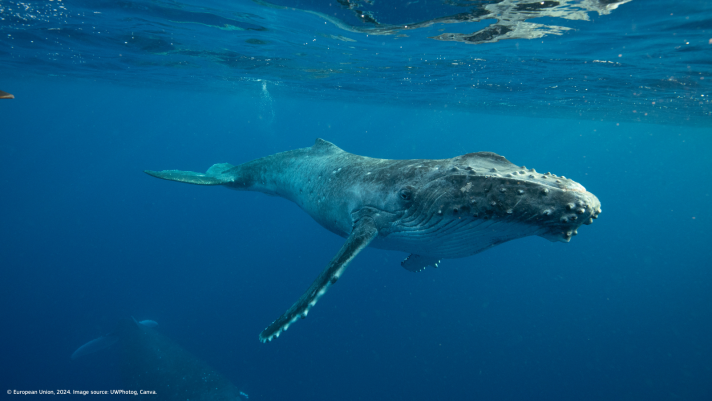
Imagine a world where people and nature live in harmony, biodiversity is protected, while sustainable development is promoted, and genetic resources are shared fairly. To reflect this ambition, 150 governments signed the Convention on Biological Diversity (CBD) in 1992.
Since then, every two years, international leaders, experts and activists participate in a high-level dialogue to establish agendas, commitments and frameworks for action.
This year’s Conference of the Parties to the Convention on Biological Diversity (COP16) will take place in Cali, Colombia, from 21 October to 1 November 2024. One of the main objectives for the governments is to review the state of implementation of the Kunming-Montreal Global Biodiversity Framework (KM-GBF), adopted in 2022 with tangible goals and targets.
Negotiated at COP 15, the Framework sets out an ambitious pathway to achieve the global vision of a world where people coexist amicably with nature by 2050.
The EU Pavilion at COP 16
At the heart of COP 16, the EU Pavilion will strengthen Europe’s commitment to reversing biodiversity loss, preserving ecosystems, and ensuring a sustainable future for all. Key EU-funded projects managed by the European Research Executive Agency (REA) will be present at the event in Cali, showcasing important scientific results to support ambitious policy decisions.
Nature-based solutions for socio-environmental issues that lead to nature-positive economy
The EU-funded NetworkNature+ is a community builder and resource centre that creates opportunities for local, regional and international cooperation to maximise the impact and spread of nature-based solutions (NbS). It supports sustainable, cost-effective and multipurpose solutions for a competitive and greener economy.
At the very core of the project is improving the state of nature and the ecosystem services it provides, fully recognising that it requires transformative change in our society. A key concept of the project’s work is also the nature-positive economy that portrays a system in which businesses, governments and other stakeholders take action to reduce and remove the drivers and pressures fueling the degradation of nature.
NetworkNature+ will participate in several sessions at COP 16 to discuss the driving forces of transformation, namely strategic multi-level governance, the transition to a nature-positive economy with nature-based solutions, and the necessary financing for biodiversity.
Find out more about NetworkNature+.
Science-policy symbiosis for a better world
Scientific research is a vital piece of the policy making puzzle, as fragmented knowledge on biodiversity poses a global challenge. BioAgora connects research results on biodiversity to the needs of policy making in a targeted dialogue between scientists, other knowledge holders and policy actors. All this with a single goal - to support a sustainable transformation for Europe's biodiversity.
RESPIN aims to assess experiences and guide nations towards the development of science-policy interfaces. The project collaborates with the Intergovernmental Science-Policy Platform on Biodiversity and Ecosystem Services and the Intergovernmental Panel on Climate Change, encouraging extensive use of their assessments and reports on biodiversity in policy making.
Biodiversa+ assembles environmental authorities, research ministries, funding organisations, and environmental protection agencies to join forces to provide science-based support for policy making. This is done through EU co-funded calls for transnational research on biodiversity and by facilitating the uptake of research results it EU and international policy processes.
CO-OP4CBD enhances the implementation of the Convention on Biological Diversity and Global Biodiversity Framework by effectively harnessing the knowledge of EU on research and innovation.
The four EU-funded projects will participate in two events highlighting the contributions of integrating scientific research into policy frameworks to advance the implementation of the Convention and the Global Biodiversity Framework.
Find out more about BioAgora, RESPIN, CO-OP4CBDand Biodiversa+.
Implementing insurance solutions for resilient and sustainable cities
The EU-funded NATURANCE project aims to encourage adoption of jointly elaborated equity principles, performance metrics and recommended approaches to analysis and design, in accordance with the EU framework for sustainable finance and the Just Transition Mechanism. To this end, the project stimulates dialogues, knowledge sharing and mutual learning across different areas of policy and practice.
NATURANCE will participate in a session, explaining the importance of integrating risk assessment and insurance coverage with nature-based solutions to enhance resilience in cities and regions.
Find out more about NATURANCE.
Engaged communities for sustainable urban ecosystems
The sustainable restoration of urban ecosystems through NbS can help cities around the world address the challenges they are facing, as NbS provides a wider range of social, environmental and economic benefits. The EU-funded INTERLACE project connects cities from Europe and the Community of Latin American and Caribbean States and equips them to effectively restore and rehabilitate (peri)urban ecosystems through NbS for liveable, resilient and inclusive cities.
The project will participate in several events in the Green Zone at COP 16 that will put the spotlight on the importance of engaging communities in the design of NbS to address urban challenges and restore ecosystems.
Find out more about INTERLACE.
Boosting economy through nature restoration
The world’s economic systems currently fail to recognise the value of nature for planetary and human health, as mainstream economic drivers continue to negatively affect the natural world. Degradation of land and marine ecosystems undermines the well-being of billions of people and costs about 10% of the annual global gross product. But restoring nature offers huge economic opportunities. The EU-funded GoNaturePositive! project champions nature-based solutions and nature-based enterprises to redefine our economic landscape.
The project is hosting two events in the Green Zone at COP 16 that will focus on nature-positive economy bridging biodiversity and economy.
Find out more about GoNaturePositive!
Read more:
All sessions of EU-funded projects at COP 16
EU-funded projects helping to achieve the new Nature Restoration Law
EU-funded projects protecting forests from fire destruction
EU-funded projects fight micro plastics and marine litter in European seas
Details
- Publication date
- 17 October 2024
- Author
- European Research Executive Agency


